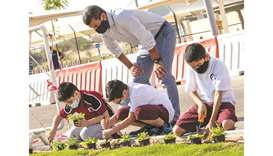Qatar Academy Sidra students recently planted 15 trees, 20 bushes, 150 tomato plants, and more than 500 seasonal flowers around campus to honour Dr Jane Goodall’s commitment to planting 5mn trees in 2020, and to help create a local ‘greening’ community.
“The planet is in danger, and children understand that,” said Preet Dhaliwal, Sustainability Instructional Coach at Qatar Academy Sidra (QAS), part of Qatar Foundation’s Pre-University Education.
“They’re feeling the effects of pollution and hearing about climate change – it’s not new anymore. Having them engaged with the environment and educating them about it is the only way to ensure they will be change-makers,” Dhaliwal said.
Engaging children in hands-on activities to increase awareness of their surroundings not only instills in them a sense of responsibility to their planet and society, but also brings with it a host of advantages to their personal and communal development.
According to Dhaliwal, ‘greening’ is a great opportunity for children to leave the classroom, get their hands dirty, and channel their energy into something both fun and educational.
And in an increasingly digital and tech-driven world, encouraging students to spend time observing and interacting with their surroundings also has a profound impact on their development and ability to make inferences and connections.
“For example, through these activities, we aim to give children a deeper understanding of where their food comes from,” Dhaliwal said.
“They start to learn that the tomatoes they eat didn’t just arrive at the supermarket, they grew from the ground, in the soil. The eggs they eat at breakfast, or even the cocoa beans in the chocolates they enjoy so much, come from nature.”
In order to enhance the connection that children feel to the environment and their surroundings, QAS approaches sustainability through the lens of a compass.
North is ‘nature’ – referring to sustainable agriculture, farming, climate, and the environment. East represents ‘economy’ – what is the economy behind a sustainable future?
“We want students to be aware of responsible production and consumption. Children are taught about fast fashion, for instance. How important is it to buy that extra jacket or pair of jeans? Where are we disposing of our old clothes?
“It helps get children thinking about the how, why, and where of their daily practices.
“At some point, they also begin influencing their families and taking the conversation forward, which is the beginning of their journey to becoming agents of change,” Dhaliwal said.
“South and west refer to ‘society’ and ‘wellbeing’ respectively.
“This allows children to be educated about global policy and sustainability initiatives and how to be agents of change and the long-term wellbeing of themselves, their loved ones, and the world.”
Children often approach Dhaliwal with their ideas for composting in their own home or encouraging recycling within their homes.
QAS also collaborates with other entities around QF who are championing sustainability.
Professors from Hamad Bin Khalifa University have visited the school to speak to both primary and secondary school students about the upcoming FIFA World Cup Qatar 2022 and how the stadiums are built sustainably.
They’ve also educated students about the green buildings around QF, the carbon oxygen cycle, and solar energy.
“The eight-year-olds currently in grade two will be 18 in 10 years. They’re the ones who will be making the decisions. And we know we don’t have much time, so we need to help them understand the bigger picture right now,” Dhaliwal added.
Article Credit: m.gulf-times
